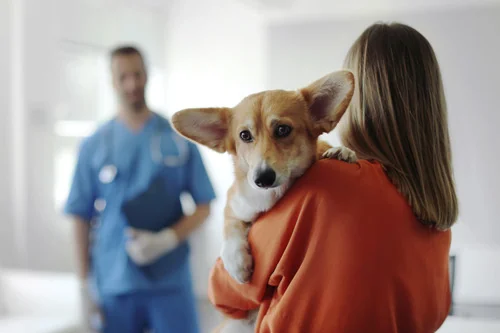Myasthenia Gravis in Dogs: Symptoms and Treatment

Myasthenia gravis in dogs is a neuromuscular disorder that affects the transmission of nerve impulses to muscles, leading to muscle weakness and fatigue. This condition can be challenging for pet owners and veterinarians alike, but understanding its symptoms and treatment options can significantly improve a dog’s quality of life. Partners Animal Hospital Asheville is here to help you navigate this complex condition. If you suspect your dog may have myasthenia gravis, call us at (828) 333-7356 or book an appointment online.
What is Myasthenia Gravis in Dogs?
Myasthenia gravis in dogs is an autoimmune disorder where the body’s immune system attacks the receptors needed for muscle contraction. This results in a communication breakdown between nerves and muscles, causing muscle weakness. The condition can be congenital or acquired, with acquired myasthenia gravis being more common in older dogs.
Symptoms of Myasthenia Gravis in Dogs
Recognizing the symptoms of myasthenia gravis in dogs is crucial for early diagnosis and treatment. Common signs include:
- Muscle Weakness: Dogs may show general weakness, especially after exercise. They may have difficulty standing, walking, or climbing stairs.
- Megaesophagus: This condition involves an enlarged esophagus, leading to difficulty swallowing and an increased risk of aspiration pneumonia.
- Fatigue: Dogs with myasthenia gravis tire quickly, often needing frequent rest breaks during physical activity.
- Drooling and Regurgitation: Due to megaesophagus, affected dogs may drool excessively and regurgitate food or water.
- Voice Changes: You might notice changes in your dog’s bark, such as a softer or more hoarse sound.
- Facial Weakness: Weakness in the facial muscles can result in drooping eyelids and difficulty closing the eyes.
Diagnosing Myasthenia Gravis in Dogs
A thorough diagnostic process is essential for confirming myasthenia gravis in dogs. Your veterinarian will start with a detailed history and physical examination, followed by specific tests:
Acetylcholine Receptor Antibody Test
This blood test measures the presence of antibodies against acetylcholine receptors. Elevated levels typically indicate myasthenia gravis.
Tensilon Test
The Tensilon test involves administering edrophonium chloride, a drug that temporarily improves muscle strength in dogs with myasthenia gravis. A positive response helps support the diagnosis.
Electromyography (EMG)
EMG tests the electrical activity of muscles and nerves. Abnormal results can indicate neuromuscular disorders like myasthenia gravis.
Chest Radiographs
X-rays can reveal an enlarged esophagus and help detect complications such as aspiration pneumonia, which is common in dogs with myasthenia gravis.
Treatment Options for Myasthenia Gravis in Dogs
Managing myasthenia gravis in dogs involves a combination of medications, supportive care, and monitoring. While the condition cannot be cured, proper treatment can significantly improve your dog’s quality of life.
Medications
- Anticholinesterase Drugs: Medications like pyridostigmine help increase the availability of acetylcholine, improving muscle strength.
- Immunosuppressive Drugs: In some cases, drugs like prednisone may be prescribed to suppress the immune system’s attack on acetylcholine receptors.
Supportive Care
- Feeding Strategies: Feeding your dog in an elevated position can help manage megaesophagus and reduce the risk of aspiration pneumonia.
- Physical Therapy: Gentle exercises and physical therapy can help maintain muscle strength without causing excessive fatigue.
- Monitoring: Regular veterinary check-ups are crucial for monitoring your dog’s response to treatment and adjusting medications as needed.
Prognosis and Long-Term Management
The prognosis for dogs with myasthenia gravis varies depending on the severity of the condition and the presence of complications like aspiration pneumonia. With proper management, many dogs can lead relatively normal lives.
Managing Megaesophagus
Megaesophagus is a significant concern for dogs with myasthenia gravis. Here are some strategies to help manage this condition:
- In severe cases, a feeding tube may be necessary to ensure your dog receives adequate nutrition.
- Feeding smaller, more frequent meals can help reduce the risk of regurgitation.
- Watch for signs of pneumonia, such as coughing, difficulty breathing, and fever. Prompt treatment is essential to prevent severe complications.
Providing Comprehensive Care for Dogs with Myasthenia Gravis
Myasthenia gravis in dogs requires a comprehensive approach to diagnosis and treatment. Understanding the symptoms and working closely with your veterinarian can help manage this condition effectively. Partners Animal Hospital Asheville is dedicated to providing the best care for your dog. If you notice any signs of myasthenia gravis or have concerns about your pet’s health, call us at (828) 333-7356 or book an appointment online. Together, we can ensure your dog receives the support and treatment needed for a better quality of life.
Recent Posts
About Us
At Partners Veterinary Group, we believe in energizing our team members through shared values, while helping them create value for our clients and patients. Knowing we can help make pets’ and people’s lives better motivates us to continually strive for excellence and love what we do.
Our team consistently works to build educational, supportive, and cooperative work environments that cater to positive experiences and professional growth. We’re constantly evolving, creating innovative ways to deliver cutting-edge medicine to our patients. We equip our teams with tools to enhance their skills and improve their knowledge.
